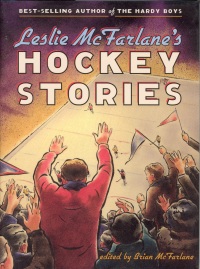| ________________
CM . . .
. Volume XII Number 18 . . . .May 12, 2006
excerpt:
Leslie McFarlane’s Hockey Stories, with a biographically-rich foreword from son Brian, contains four short stories of traditional Canadian hockey pride that root for the underdogs of amateur, small-town hockey. The four stories, “Montville Boy Makes Good,” “Goalie Garrison’s Goat,” “Too Slow to Count,” and “They Didn’t Know Hockey,” represent a moment of fame — noticed by a crowd, the team, or a coach — for one of the lesser-known players on fictional amateur teams. The overall message of “if at first you don’t succeed” threads the tales together. Although McFarlane is best known for his work as Franklin W. Dixon, one of the ghost-writers for the Hardy Boys, his writing comes alive when it follows Canada’s national sport. The stories share the same Depression-era flavour that McFarlane, who wrote during this time, captures easily in his work. The language for modern-day readers is somewhat dated; in “They Didn’t Know Hockey,” the narrator notes, “Mary was Dan’s girl; and when he met her, as was his custom, after the game to escort her home, he was astonished to find her in bad humour.” Despite—or rather due to—the aging colloquialisms in McFarlane’s writing, the language brings out a familiar echo of the time, and would, most likely, create an exciting read aloud from parent to hockey-crazed fan before bed, or be a good silent read for any avid fan of traditional hockey stories. McFarlane knows hockey, and he manages to bring the lively, rough-necked, cutthroat sport to life in the pages of each story. He weaves tales of fast-paced ice action, the stuff of which urban hockey legends are made. McFarlane plays with points of view with natural ease, moving from the perspective of an entire town in “Montville Boy Makes Good” to that of a coach in “Goalie Garrison’s Goat”; he switches from the weak-legged Tim Cordell who “played every game as if it were a Stanley Cup” in “Too Slow to Count” to the temporary puck-hog, Dan Hawkley in “They Didn’t Know Hockey.” He deftly alternates from limited omniscient to first person perspectives, and creates distinctive, unique voices for each story while managing to maintain a cohesive style. McFarlane gives little-known characters the most honoured spots in the stories; in every story a player—not necessarily the protagonist—faces some sort of obstacle, possibly his own greed for fame—or a town’s greed for fame—that they have to overcome. The ultimate win at the end of each story is inevitable and predictable; repetitive moral lessons find their way into every story, but the most important lesson is the love of the game—and loving the game not for fame or for money but for the game itself. Hockey Stories not only brings the game alive, but also represents what is quintessentially “Canadian” about the sport; McFarlane digs into small-town hockey mentality and comes up rich. Hockey Stories makes an excellent addition for any collection of Canadian tales of small-town life during the Depression. Recommended. Sandi Harrison currently a student in the Master of Arts in Children’s Literature at the University of British Columbia in Vancouver, BC.
To comment
on this title or this review, send mail to cm@umanitoba.ca.
Copyright © the Manitoba Library Association. Reproduction for personal
use is permitted only if this copyright notice is maintained. Any
other reproduction is prohibited without permission.
NEXT REVIEW |
TABLE OF CONTENTS FOR THIS ISSUE
- May 12, 2006.
AUTHORS |
TITLES |
MEDIA REVIEWS |
PROFILES |
BACK ISSUES |
SEARCH |
CMARCHIVE |
HOME |
